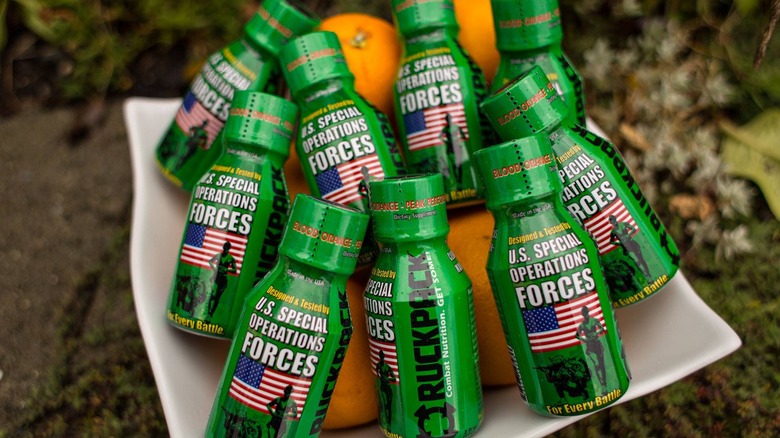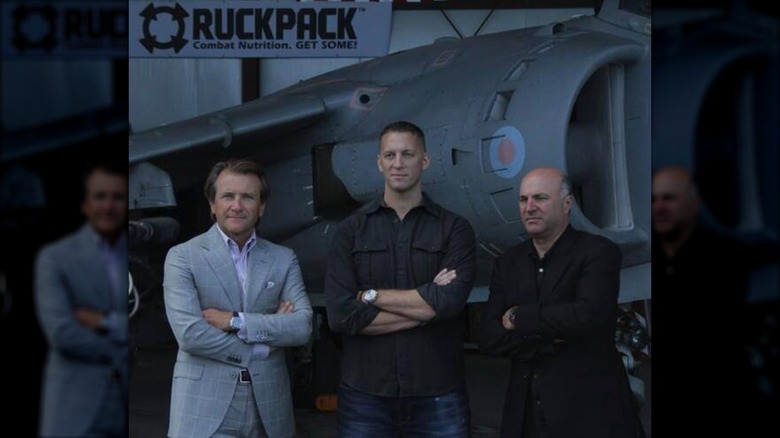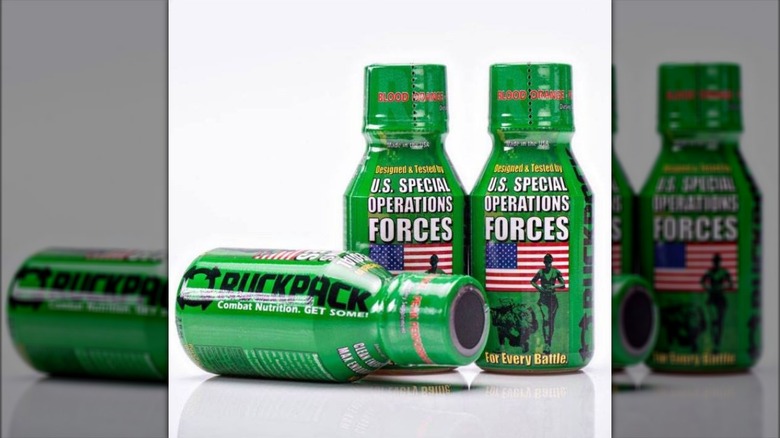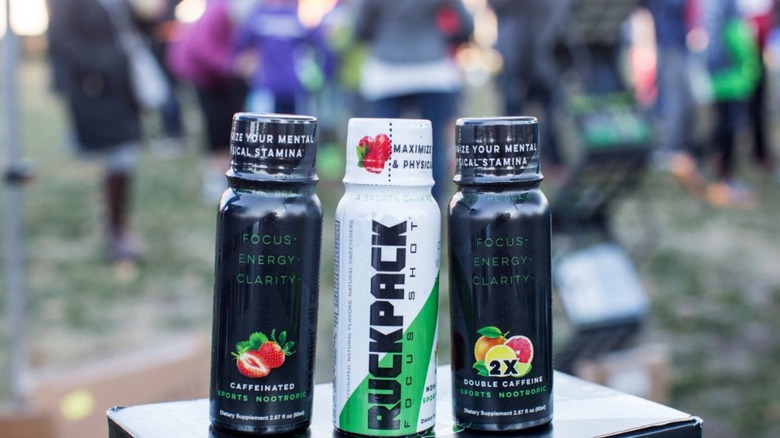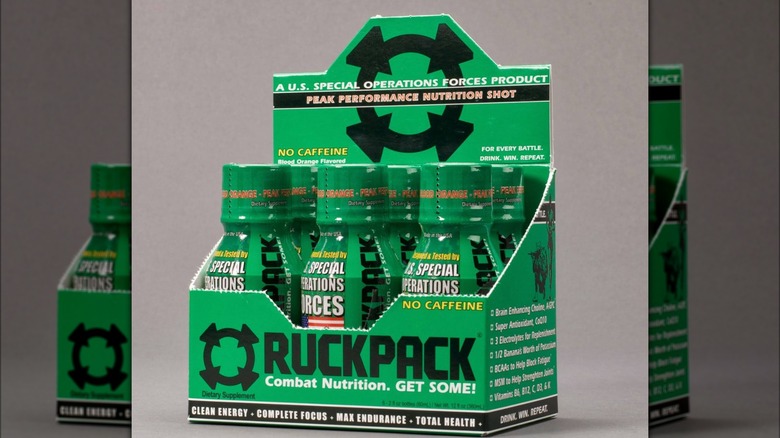RuckPack: Here's What Happened After Shark Tank
We may receive a commission on purchases made from links.
Energy drinks are popular pick-me-ups to power through slumps, push past fatigue, and boost mental and physical performance. But they are also often packed with large amounts of sugar and caffeine, which can cause jitters, insomnia, headaches, dehydration, and anxiety when consumed regularly (via Cleveland Clinic). For most people, these are important things to consider before cracking open an energy drink. But for the many military personnel who also rely on such beverages, the same symptoms can lead to grave consequences if they occur during combat. That is where RuckPack comes in.
Founder Rob Dyer was an active duty officer in the United States Marine Corps when he came up with the idea, and then appeared on Season 4, Episode 10 of "Shark Tank" in 2012. Dyer explained that, when on duty, military missions typically lasted for a week or more, during which Marines could only rely on the food that they carried with them. Because of this fact, energy drinks have become a popular supplement. In fact, a 2016 study published in PubMed Central revealed that 28% of the 1,708 U.S. Navy and Marine Corps personnel surveyed consumed energy drinks.
But, Dyer stressed that, "In the environment [during military operations], lives can be lost if you are not operating at 100%." Side effects such as jitters are not ideal during combat, so RuckPack was developed to present a better alternative. Dyer removed the negative side effects from energy drinks and formulated a singular caffeine-free shot which, he claimed, was designed and tested by Marine Special Operations Forces.
What happened to RuckPack on Shark Tank?
Supplements like energy drinks don't always fare well on the show — as was the case with "Shark Tank" season eight contender Energybits — but RuckPack would prove to be an exception for the series. At the time of its appearance, independent stores — particularly those around the Marine Base in Quantico, Virginia — were already selling the drink. However, RuckPack was out of inventory and needed a $75,000 investment from a Shark to stock back up. In return, Dyer was willing to part with 10% equity of the company.
At the time, RuckPack was 80% owned by military service members, and had 16 equity holders that had collectively raised over $240,000. Additionally, Dyer was an active duty officer who worked full-time as an accounting professor at the United States Naval Academy with two-and-a-half years to go till the end of his tenure.These facets concerned Mark Cuban (who is officially leaving "Shark Tank") and Barbara Corcoran, who feared that the company had already raised too much money for where it was at the time and that Dyer wouldn't be able to give his undivided attention to RuckPack.
The two Sharks both declined to make an offer, as did Daymond John who was already an investor in a competing business. But it wasn't the end for RuckPack. Both Kevin O'Leary and Robert Herjavec were keen to invest and ultimately teamed up to put forth a total of $150,000 in return for 10% for each Shark (AKA 20% total). It was an offer that Dyer quickly accepted.
RuckPack after Shark Tank
During the episode, Rob Dyer agreed to part with more equity than his original ask, but he later admitted on The What Would U Ask Podcast that he would have diluted even more during the bargaining, if needed. The entrepreneur had his eyes set on Shark Kevin O'Leary before entering the Tank and was willing to offer up to 40% of equity to get him onboard. The fact that he got two Sharks, including O'Leary, for less than half of that made the deal practically a bargain for him.
Once its episode aired, RuckPack experienced the "Shark Tank" Effect in full force. There was so much traffic to the website that it crashed and sales were at an all-time high. What RuckPack took a year to earn before "Shark Tank," the company made in less than a day as sales hit $35,000 in three hours after the episode went live. Over the next year, RuckPack made its way to 10,000 stores, bringing its revenue to over $500,000. In fact, the effect continued for years after the original air date in 2012. In the 2021 podcast appearance, Dyer said that there was a boost in sales anytime RuckPack's episode re-aired in America or elsewhere — even as much eight years later.
On RuckPack's "Beyond The Tank" segment, Dyer walked O'Leary through all the improvements he had made on the energy shots since the show. More nootropics (drugs that enhance cognitive function) were added to the drinks, new variants such as caffeinated shots for the general masses were tested, and new flavors like raspberry were introduced.
Is RuckPack still in business?
Despite the fact that RuckPack's Rob Dyer had walked away with not one but two Shark investors — which is more than the other "Shark Tank" energy drink, Cougar Energy – the company's current status is rather ambiguous. RuckPack's Instagram account has been taken down, but there's no indication as to why.
In fact, one of the last posts on the company's Facebook page on April 5, 2024 said that the company was "currently overstocked on our amazing RuckPack shots," and had tons of drinks that went out of date that month. The soon-to-expire shots were on sale and going for a dollar. However, there has been virtually no sign of RuckPack updates since.
RuckPack had announced in 2013 that it had snagged a $4 million national distribution deal with the pharmacy and wellness chain Walgreens to put the energy drinks in 8,600 Walgreens stores across the country. The deal was slated to pit RuckPack as a strong contender in the competitive energy drink category at supermarkets. Although there is no official news of what became of that partnership, RuckPack in not listed on Walgreens' website, and its shots are marked as unavailable on Amazon.
What's next for RuckPack?
RuckPack hasn't had an easy journey since "Shark Tank," and those at the company's helm has changed over time, too. In 2014, RuckPack announced that Marine Spec Ops veteran Derek Herrera would step in as RuckPack's new CEO. However, founder Rob Dyer confessed in "Beyond The Tank" that the change in management didn't bode well for the company, leading him to find another CEO in Jimmy O'Brien Jr.
According to LinkedIn, O'Brien too stepped down from the position in 2017. Additionally, Dyer bought back O'Leary and Herjavec's equity in the months after the show — a move that he later admitted on The What Would U Ask Podcast that he very much regretted.
These critical changes may have jeopardized RuckPack, causing it to shutter for good. Considering the fact that the company was still active on Facebook until May 2024, however, could mean that RuckPack has simply stumbled into temporary troubles. After all, RuckPack has had issues with inventory in the past, causing the energy shots to go out of stock. The official website is the best bet for updates as of late 2024, at least when it comes to purchasing shots.
Besides, Dyer's LinkedIn page indicates that he is still the CEO of RuckPack despite the brief changes. Although he also works full time as the CEO of a cyber security company called Eagle Tech Corp, it wouldn't be the first time he's juggled two roles at once.

